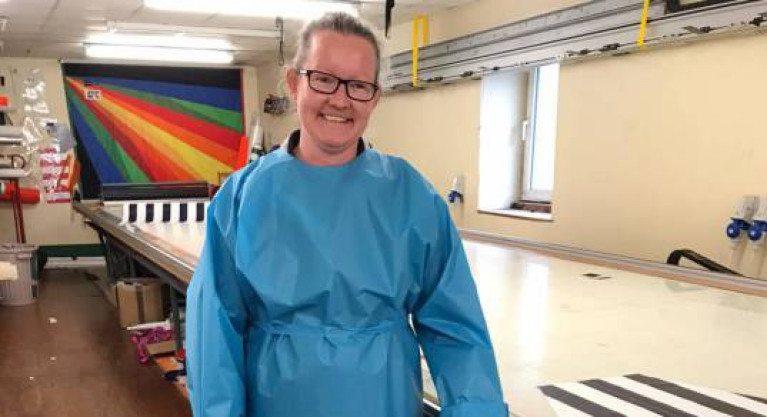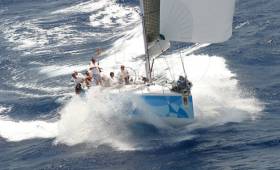Displaying items by tag: Claire Morgan
Claire Morgan is Sailor of the Month for April
When the story of the Covid-19 pandemic in Ireland finally comes to be written, there’ll be many individuals - both voluntary and professional - who will be recognised as having contributed way beyond the call of duty in helping to fight the scourge. In choosing Claire Morgan of UK Sailmakers of Crosshaven, who worked night and day to change and operate the company’s production line to meet the unprecedented demand for PPE gowns, we are honouring one in order to honour the many to whom we all owe our heartfelt thanks.
Yesterday’s report on Afloat.ie of the major changes shaping up in the ownership structure of the UK/McWilliam Sailmakers business in Crosshaven clearly rings a bell with many in the sailing community at home and abroad. The remarkable response has reinforced the notion that the story of the McWilliam family’s involvement in Irish and international sailing is in many ways a story shared and lived by everyone with a genuine enthusiasm for our sport. W M Nixon reflects on its broader implications.
The past is only really of value when we can relate it to a vibrant present and an interesting future. For sure, history has its own special allure. There may be many different interpretations of what happened and how it happened. But if we ruthlessly pare it down to the most basic timeline, the reasons for argument melt away in face of a short list of inescapable facts. And there’s something very reassuring in a short list of inescapable facts.
But when history is allowed to be more complex, there’s an element of the comfort blanket in immersing ourselves in it. By all means do so if you wish. But life will soon be passing you by if historical obsessions are allowed to dominate your view of the world. Closetted historians – if they emerge from their closed little worlds at all – very quickly discover that other folk are only mildly interested in history as a point of reference against the here and now, and what might be happening tomorrow.
Thus in anticipating what the new team of Barry Hayes, Claire Morgan and Graham Curran will be bringing to Crosshaven at the heart of their new hub of creativity, we’ve been trying to get the proper perspective. In addition to providing their own special skills, they’re able to draw on the shared experience and technologies of their colleagues at almost 50 sail-lofts worldwide.
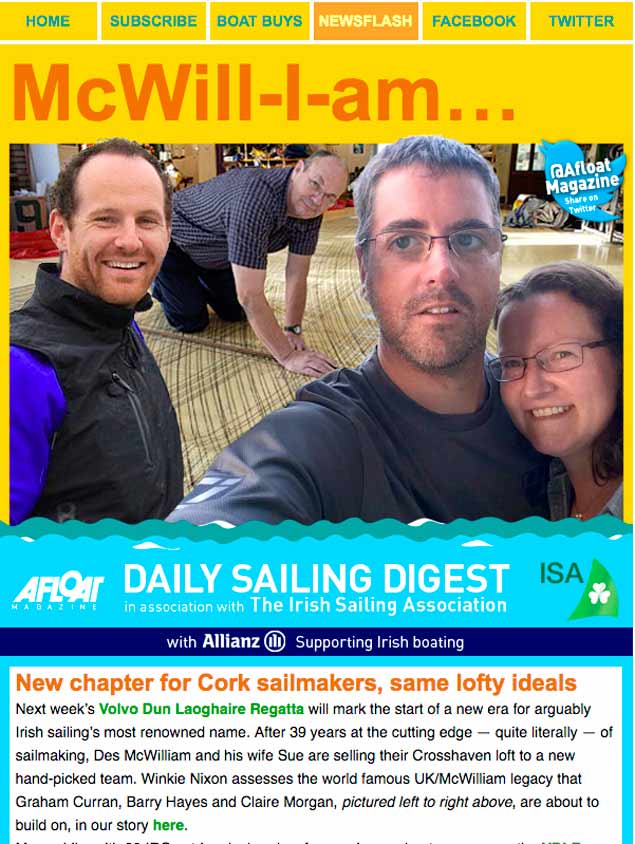 Des McWilliam's retirement and the new team at UK McWilliam in Cork of Barry Hayes, Claire Morgan and Graham Curran featured on Afloat.ie yesterday
Des McWilliam's retirement and the new team at UK McWilliam in Cork of Barry Hayes, Claire Morgan and Graham Curran featured on Afloat.ie yesterday
While Graham is a fast learner who has ascended the rising path in Crosshaven in just three years, and Claire has formidable business and financial skills, it is Barry who is most truly representative of the UK International Sailmakers ethos.
Orginally from Schull, he started in the McWilliam’s Crosshaven loft in 1999 just three years after they’d become associates of UK Sailmakers. Yet within three years he had been invited to join the “mother loft” in New York run by Butch Ulmer, and there he rose to become loft manager.
Then he was recruited from the mother loft to the group’s biggest loft of all, in Hong Kong run by the legendary David Yeung. In his fourteen years there, he has learned everything that David Yeung could teach, and when the great sailmaker finally retired a couple of years ago, it was the young Irishman who took on the role as manager.
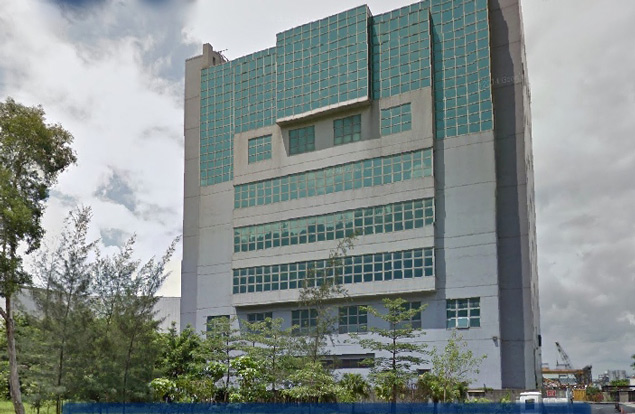 The Hong Kong loft of UK Sailmakers is very typical of the city in which it is located.....
The Hong Kong loft of UK Sailmakers is very typical of the city in which it is located.....
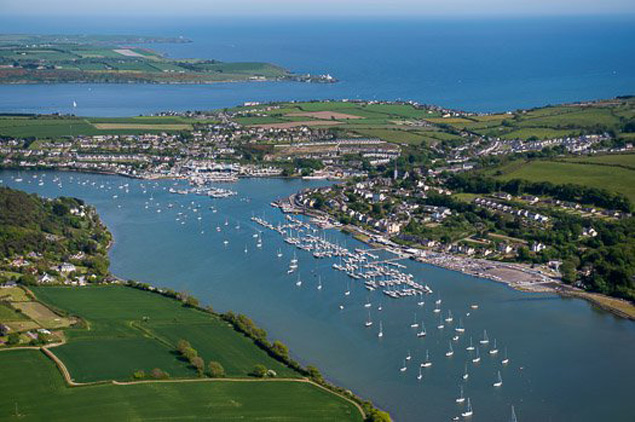 ...which is very different to Crosshaven. Photo: Robert Bateman
...which is very different to Crosshaven. Photo: Robert Bateman
During his time in Hong Kong, Barry Hayes had been at the heart of the loft’s development of titanium sails – among many other projects – so it will be fascinating to see what fresh vistas of development he opens up back in Crosshaven. In other areas of advanced technology, you’d be surprised by the number of specialised Irish outfits – some of them quite small – which are in the forefront of research and development in their own field, so why not Crosshaven and sailmaking?
At the same time, as a sailmaker pure and simple, Barry Hayes has the reputation of being a man who’ll stay up all night beavering away at repairs on your torn mainsail in order that you can sure of getting racing next day, so it’s clear that the loft’s regular everyday customers need not worry that arcane research experiments and developments will distract from the need for traditional sail making and repair services.
And with their considerable combined experience of the McWilliam ethos, and the collegiate outlook of the UK Sailmakers organisation, the new owners will be well aware that the hours will be ridiculous, the miles travelled absurd, and the challenges faced infinite in their variety.
Thus one of my favourite Des McWilliam yarns is of the time he was asked to make sails for the traditional boats of the Achill Yawl type which sail and race on Achill Sound and the nearby waters of Clew Bay. That hero of the Mulranny area, Dr Jerry Crowley, reckoned that a healthy class of Achill yawls regularly sailing in summer would be good for everyone and for community spirit, so he gave every encouragement to getting the fleet into proper action.
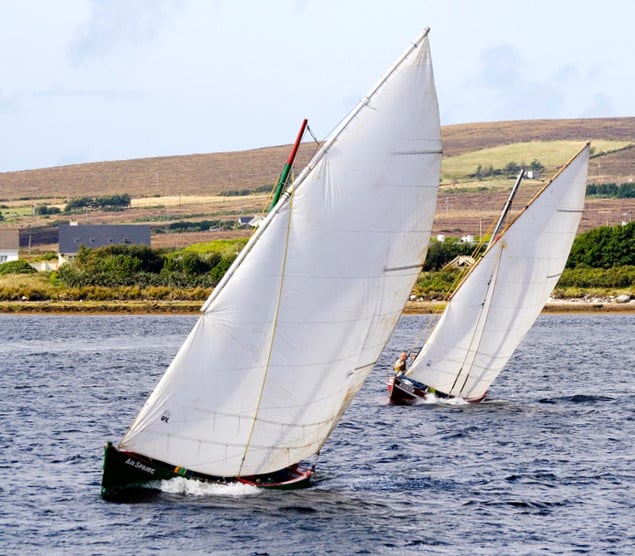 Traditional Achill yawls racing in Achill Sound. With their potentially very powerful rig, when Des McWilliam turned up with new sails, he said it was like putting a Ferrari engine into a Mini
Traditional Achill yawls racing in Achill Sound. With their potentially very powerful rig, when Des McWilliam turned up with new sails, he said it was like putting a Ferrari engine into a Mini
The upshot of it was that as the Celtic Tiger years began to build up a head of steam, every pub along the shores of Achill Sound and anywhere close to the coast nearby found itself sponsoring an Achill Yawl to swell an already considerable privately-owned fleet.
It became increasingly competitive, so inevitably an enquiry was put through to Des McWilliam about making a suit of racing sails, and with one order, others followed. As the Achil yawl sets a powerful lug rig which is as near as you can get to actually being an even more powerful and efficient lateen rig, when Des turned up with a load of max-sized sails at Achill Sound, he asked Jerry Crowley was he aware this would be the equivalent of putting a Ferrari engine into a little old Mini, or even Morris Minor?
This was exactly the impression the owners and skippers wished to make, so the bould Des went off for his first race with the Achill Yawls. They were reaching along in a bunch, and the boat to weather bore down on them until the hulls thumped, and then hauled her wind only the slightest amount.
At the impact Des had called across to the other helmsman: “You can’t do that”. Back came the unanswerable reply: “I just did”. End of conversation.
Within the UK Sailmakers group, Des acquired something of a reputation as an ace specialist in spinnakers, so when America’s Cup legend Dennis Conner out in San Diego asked his local UK Sailmakers loft for a new spinnaker for his personal IRC 50, manager John Bennett passed the order on across America and across the Atlantic to Crosshaven. As Des says, it’s not every day you get an order for a special spinnaker for Dennis Conner, and they gave it the best they could.
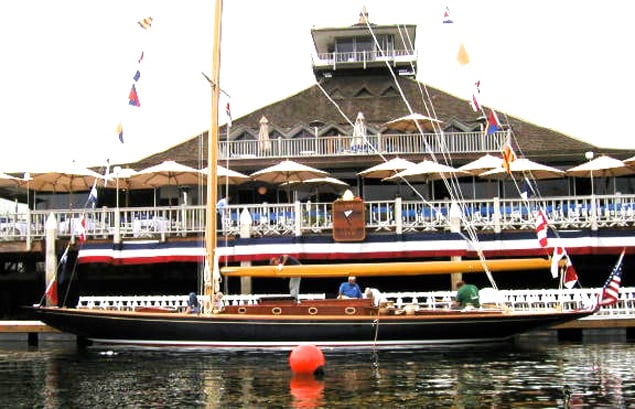 Dennis Conner’s classic Q Class sloop Cotton Blossom II, restored by Johnny Smullen, makes her debut at the San Diego YC. The local UK Sailmakers loft passed along the specific request that Des McWilliam design the spinnakers for the boat
Dennis Conner’s classic Q Class sloop Cotton Blossom II, restored by Johnny Smullen, makes her debut at the San Diego YC. The local UK Sailmakers loft passed along the specific request that Des McWilliam design the spinnakers for the boat
It seems it worked, for when Dun Laoghaire’s own Johnny Smullen restored the classic Q Class Cotton Blossom II in San Diego for Conner, the request came through to Crosshaven for the spinnakers for the re-born boat. It was quite a tricky one says Des, as we had to shape the panels in classic original style.
So the default position in the Crosshaven loft is that the unusual order is the norm. They’re delighted to take on all sorts of challenges, and as founder John McWilliam was originally a fighter jet pilot, in his busiest years with the loft he put his flying skills to good use by having a company plane - a PA 23 Geronimo - for which they didn’t need to hire a pilot to get sails and services as rapidly as possible to customers near and far.
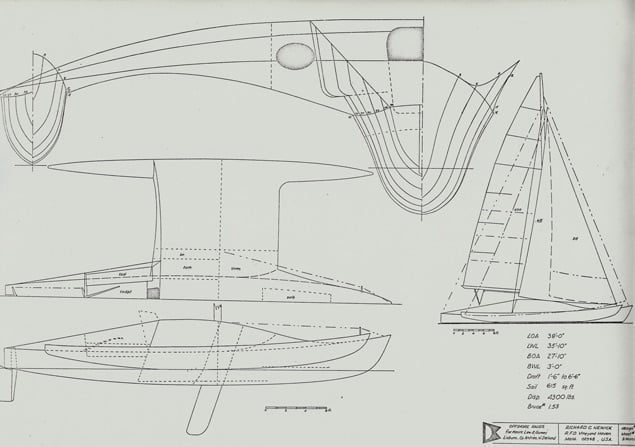 Dick Newick’s plans for Downtown Flyer, built in a shed in Lisburn, County Antrim
Dick Newick’s plans for Downtown Flyer, built in a shed in Lisburn, County Antrim
However, even by McWilliam standards, the liberation of the trimaran Downtown Flyer from a hidden berth in France was in a league of its own. Downtown Flyer was a 38ft Newick tri built by Brian Law and Dickie Gomes in a shed in Lisburn in Northern Ireland for the 1982 Round Britain and Ireland two-handed race, in which they did mighty well. In fact, they did mighty well in just about every event they entered, and put in such a spectacular showing at the Speed Week in La Trinite in France that when, after a couple of years of very intensive campaigning, they decided to sell, Downtown Flyer was quickly snapped up by a young French skipper who very promptly paid 50% of the purchase price.
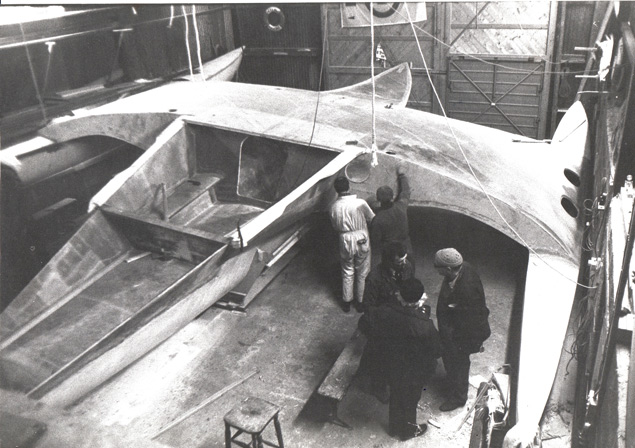 Downtown Flyer under construction in 1982. Her beam was nearly as great as her overall length. Photo W M Nixon
Downtown Flyer under construction in 1982. Her beam was nearly as great as her overall length. Photo W M Nixon
He was so keen to be in place for the next big race in France that the two lads allowed him and his crew to sail the boat away with the promise that the rest of the money would be paid the following week. Weeks passed. Months passed. But money came there none. Recourse to lawyers failed too. They were getting nowhere. But as Johnny McWilliam had made sails for them for a number of craft, he was aware of their predicament, and enthusiastically joined in a project to re-possess the boat.
She was berthed in the heart of a sort of Navy yard in Lorient. But the guys worked out that if they could fly in Johnny’s plane to a little local airfield and implement the plan once night came on, it might just be managed. So they flew down to Brittany and after helping Johnny re-fuel for his fight home by using a local garage and portable tanks so as not to attract official attention, the Liberation Team got to the boat without being noticed as night drew on.
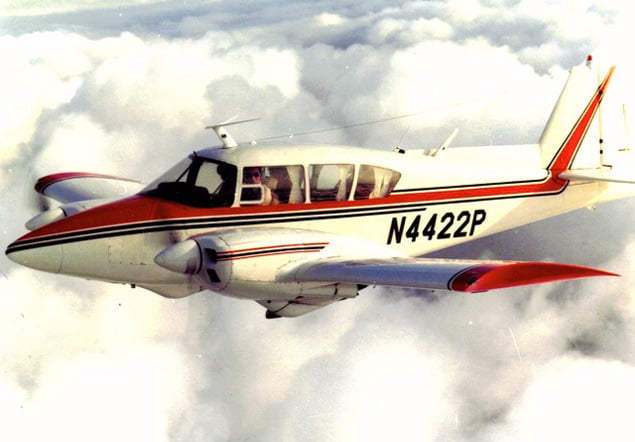 The McWilliam Sailmakers’ PA 23 Geronimo was useful for many tasks, not least a surreal boat liberation
The McWilliam Sailmakers’ PA 23 Geronimo was useful for many tasks, not least a surreal boat liberation
They got away by paddling Downtown Flyer as quietly as possible the length of Lorient Harbour, where they sped away once sail was set. But instead of heading straight for Ireland as any search ship would have expected, they sailed due west into the middle of the Bay of Biscay before turning north for a safe return.
They kept the boat for sale to another purchaser, and in due course the French skipper was given his deposit back. But to receive it, he had to take the Roscoff ferry to Cork to meet the Downtown duo, as they had to return extra equipment that had somehow been added to the boat despite the potential buyer’s supposed penniless state.
In his retirement Johnny has devoted himself to glider flying a a very advanced level, while Des looks forward to getting in some sailing just for fun - he much enjoyed a recent outing with the new sails he made for Guapa, the Bill Trafford-reworked Etchells 22.
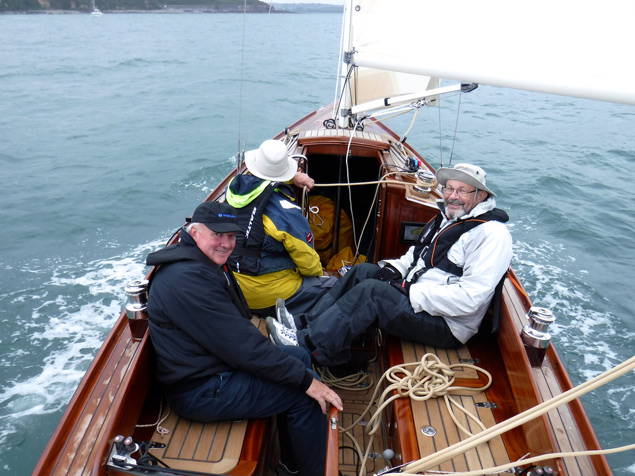 Making a classic suit of sails for the uniquely re-configured Etchells 22 Guapa a month ago was a special pleasure for Des (right) But there’s no doubt that Des’s passion for vintage and classic cars can now come centre stage. It started with a hectic youthful career with vintage motorbikes, but these days he has a sort of compromise with a 1934 Morgan F4 three-wheeler in which he and his wife Sue can take on hill climbs and other vintage car trials with eccentric style.
Making a classic suit of sails for the uniquely re-configured Etchells 22 Guapa a month ago was a special pleasure for Des (right) But there’s no doubt that Des’s passion for vintage and classic cars can now come centre stage. It started with a hectic youthful career with vintage motorbikes, but these days he has a sort of compromise with a 1934 Morgan F4 three-wheeler in which he and his wife Sue can take on hill climbs and other vintage car trials with eccentric style.
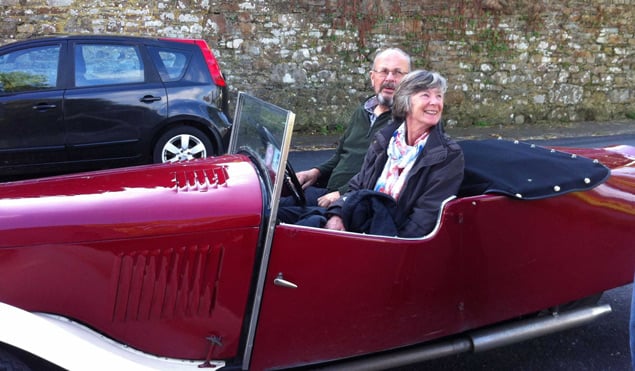 Des and Sue McWilliam in their 1934 vintage Morgan three-wheeler
Des and Sue McWilliam in their 1934 vintage Morgan three-wheeler
In fact, in this little machine, there’s little enough for their comfort when they’re undertaking challenges like the Tim Healy Pass which snakes over the mountains between Bantry Bay and the Kenmare River, but they’re seen doing it with style in this short vid from Easter last year:
The virtue of the Tim Healy event is that afterwards everyone winds their way down from the mountain to the comfort of that noted cruising enthusiasts’ pub, Teddy’s at Kilmakilloge, and the event concludes with a dinner where the attendance on this occasion included nine former Circuit of Ireland winners. But the real winner of the evening was Sue, as she received the Trophy for the Bravest Participant – as that little vid reveals, it was well earned.
Unfortunately, a couple of weeks later while on their way to another vintage car trial, they were the victims of an absent-minded tourist who forgot that we drive on the left in Ireland, and in a serious smash Sue was badly injured. But she’s on the mend, and is looking forward to sharing Des’s new availability for their many interests and family gatherings.
Meanwhile at the Crosshaven loft, the new order of management is already moving into place, and next week will see the UK Sailmakers Crosshaven team present in full strength at the Volvo Dun Laoghaire Regatta. These are very interesting times in sail-making, and the hothouse of competition that Dublin Bay will provide next week is just what’s needed to get fresh ideas to take shape.
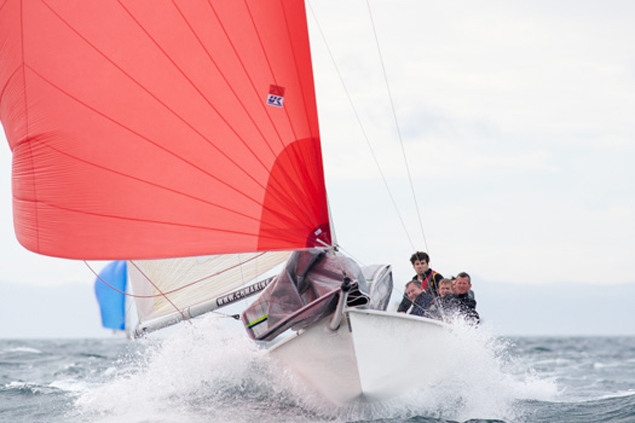 This is what we do. One of the O’Leary Clan’s 1720s burning it up under a new UK Sailmakers asymmetrical kite
This is what we do. One of the O’Leary Clan’s 1720s burning it up under a new UK Sailmakers asymmetrical kite


























